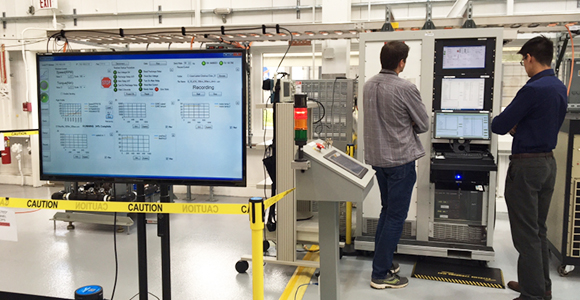
(Photo: NASA)
The statewide discussion on the creation of a new statewide online community college continued in the Antelope Valley this week.
The 114 California Community Colleges comprise the largest system of public higher education in the nation—with over 2.1 million students.
The plan for a 115th college that would be fully online is designed to help the millions of Californians who need to upgrade their job skills.
As Executive Vice Chancellor Van Ton-Quinlivan told attendees at the latest Future of Work MeetUp in Palmdale, the fast moving and ever-changing California economy is unforgiving for those without skills.
“In fact,” she said, “80 percent of today’s middle-skills jobs require some digital skills—a trend that is growing.”
Ton-Quinlivan also emphasized that these workers—who often are the main wage earners in their families—struggle to have the time and the money to an existing community college. Governor Brown’s idea is to take it to them.
They are being called “stranded workers”—those who are being left behind as the economy and technology evolves.
“The shelf life of skills is getting short,” said Ton-Quinlivan. “Many of these students will need to attend more than once in order to continue to build their skills.”
The executive vice chancellor acknowledges this population will need a high support student experience that is culturally appropriate and, if the concept is approved by the state legislature this summer, the student will be helped by content matter experts as well as faculty mentors and assessors.
The Palmdale event was the latest in a series of meetings being held across California. A group of local leaders also discussed the needs of the region's economy where advanced manufacturing is a major employer.
Antelope Valley College President Ed Knudson discussed the highly successful partnership his school has with Northrop Grumman—a major aerospace employer with facilities in the area.
Northrop Grumman was in dire need of a stream of trained employees for its expanding manufacturing business. And the high desert communities of Palmdale and Lancaster simply weren't producing them at the levels the company and other area manufacturers needed.
The program at AVC was honored last year as one of three winners of the statewide Partnership of Industry and Education (PIE) at the California Economic Summit.
It’s intense. Students receive 320 hours of instruction in eight weeks while earning 22 college credits.
Perhaps more importantly, when they are done, 90 percent of them are hired by Northrop Grumman.
Those not hired by the manufacturer may be hired by other aerospace companies or train and bus manufacturing companies that dot the high desert of northeastern Los Angeles County.
“Northrop Grumman is bring back manufacturing skills to California,” said Orv Dothage, a 30-year veteran of the aerospace giant told the audience.
Public-private programs like the AVC-Northrop Grumman partnership and the successful implementation of a statewide online community college are critically needed in California to fill these workforce gaps and help Californians earn good-paying jobs.
As Van Ton Quinlivan emphasized, “California employers are struggling with their talent infrastructure.”
The next Future of Work MeetUp is scheduled for San Diego on Monday, April 2, and the MeetUp series will continue across California into May.

